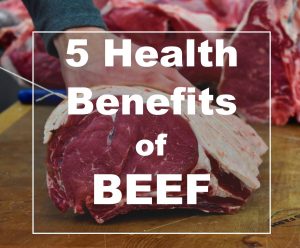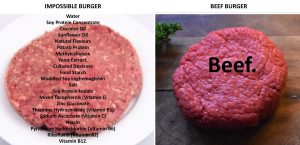5 Health benefits of beef

Meat has been a staple in human nutrition for at least two million years. In fact, research has suggested without the inclusion of meat, it is unlikely that early humans could have developed their brain size and complexity, pretty cool.
Today, meat continues to play an important role in our diets, providing us with essential amino acids and fatty acids, as well as an abundance of micronutrients vital for maintaining optimal health.
So, here’s a look at beef and 5 reasons why we need it in our diets.
1. Rich in B Vitamins
Red meat is a rich source of B vitamins which are essential for many of our body’s functions. Vitamin B12 is vital for proper functioning in nearly every system in our body, and being deficient in this nutrient has shown to play a role in ageing, cancer, neurological disorders and cardiovascular disease.
Vegetarians, vegans (or any diet excluding meat), pregnant women and breastfeeding women are at high risk of being deficient in B12, and may want to consider tracking this in their diets.
* A great source of B vitamins is any of our beef products – try our hand-prepared steaks, lean steak mince and any of our beef roasting joints.
2. It’s a complete protein source
Both red and white meat contain all the essential amino acids (proteins which are the building blocks of life), making meat a complete protein source! As humans are unable to produce these essential amino acids naturally, we must consume them through our diets. We need protein for growth, maintenance and repair of our bodies, and meat it a great source of this.
*Here’s a few of our protein packed products & their protein content per 100g:
Chicken breast 32g
Beef steak 29.2g
Pork steak 31.6g
Lamb chop 31g
3. Healthy fats & cardiovascular health
Fat is a vital macronutrient and essential for maintaining optimal health. However, for many years, fat was made the enemy. Misguided information from public health institutions led to people avoiding fat (particularly saturated fat) due to concerns about cholesterol and the link with heart disease. However, current research has now shown this is not the case and here’s a few reasons why:
Saturated fat is not the enemy!
Research has shown that cholesterol particles derived from fat do NOT increase risk of heart disease. In fact, studies have shown that natural saturated fats found in beef can actually reduce the risk of heart disease by lowering LDL cholesterol (bad) and improving the ratio of HDL (good) cholesterol.
Refined sugar & the so-called Western diet
Numerous studies have linked the Western diet to an increased risk of heart disease. Although the western diet is high in saturated fat, it’s also extremely high in refined sugar and carbohydrates (such as bread, biscuits and sweets) which studies have shown to be detrimental to your health. Furthermore, some of the latest research has shown that reducing saturated fat and increasing refined carbohydrates can promote heart disease, obesity and diabetes.
Source of CLA
Beef is a great source of CLA (conjugated linoleic acid) fatty acid. Studies have shown CLA can assist with fat loss by improving insulin sensitivity and help prevent many conditions including heart disease, cancer and type 2 diabetes. So, grab a steak and enjoy this nutrient dense food.
4. Vitamin D, iron & zinc
Red meat isn’t just rich in vital B vitamins, it’s packed full of other micronutrients required for our health and wellbeing.
Vitamin D
For people who don’t have much time in the sun, red meat can significantly contribute to overall vitamin D intake and prevent degenerative bone disease such as rickets.
Iron
Iron is a vital nutrient and one we often don’t get enough of. It plays a role in immune function, haemoglobin production, eliminating fatigue, and is particularly important for pregnant women as iron is crucial for foetal brain development. The type of iron found in beef is heme iron, and studies have shown this is more easily absorbed compared to iron found in plant foods.
Zinc
Zinc is another important mineral found in red meat and involved with many of our body’s functions such as regulating gene expression and the structure of certain proteins and enzymes. As with iron, zinc found in beef is more easily absorbed, and even a small amount of beef can prevent deficiency.
5. Weight loss
Meat in general is one of the most satiating foods you can eat. Why’s this important? It means you’ll be feeling fuller for longer in comparison to eating high-glycaemic carbohydrates such as rice, pasta, bread or anything sugary. Specifically, eating foods high in protein has shown reduce the hunger hormone ghrelin, and increase the satiety hormone leptin, which can lead to a reduction in calories.
Bonus point
And if you wanted any more reasons to keep enjoying beef, check out this graphic comparing a steak burger to a fake meat burger (impossible burger). The key ingredient in this fake meat burger is soy leghemoglobin (SLH), which is derived from genetically modified yeast. A study in rodent models found that SLH resulted in unexplained weight gain, blood changes indicating signs of inflammation or kidney disease, as well as possible signs of anaemia. We’ll stick with meat…

References
- Pobiner, B. Evidence for meat-eating by early humans. (2013) Nat Educ Knowl.
- Milton, K. The critical role played by animal source foods in human (homo) evolution. (2003) J Nutr 133, 3886S–3892S.
- Li, D, Siriamornpun, S & Wahlqvist, ML. (2005) Lean meat and heart health. Asian Pac J Clin Nutr.
- Lunn, J & Theobald, H (2006) The health effects of dietary unsaturated fatty acids. Nutr Bull.
- Scientific Advisory Committee on Nutrition (2015) Draft Vitamin D and Health Report.
- Ploudre, M, Jew, S, Cunnane. Conjugated linoleic acid: why the discrepancy between animal and human studies? (2008) Nutr Rev 66,415–421.
- Paddon, D. Westman, E. Mattes. Protein, weight management, and satiety. (2008) Am J Clin Nutr 87.
- Wyness, L. Weichselbaum, E. Williams, B. Benelam, B. Riley, S. Red meat in the diet: an update. (2011).
- J, Hunt. (2003) Bioavailability of iron, zinc, and other trace minerals from vegetarian diets. (2003)The American Journal of Clinical Nutrition, Volume 78, Issue 3.
- Sarah, K. Gebauer, Jean-Michel Chardigny, Marianne Uhre Jakobsen, Benoît Lamarche, Adam L. Lock, Spencer D. Proctor, David J. Baer. Effects of Ruminant trans Fatty Acids on Cardiovascular Disease and Cancer: A Comprehensive Review of Epidemiological, Clinical, and Mechanistic Studies, Advances in Nutrition, Volume 2, Issue 4.
- J, Gaullier. J, Halse. K, Høye. K, Kristiansen. H, Fagertun. H, Vik, O, Gudmundsen (2004). Conjugated linoleic acid supplementation for 1 y reduces body fat mass in healthy overweight humans, The American Journal of Clinical Nutrition, Volume 79, Issue 6.
- Impossible Foods, Inc. GRAS notification for soy leghemoglobin protein preparation derived from Pichia pastoris: GRAS Notice (GRN) No. 737. (2017).
